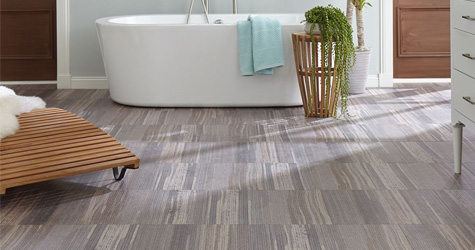In recent years, the flooring industry has witnessed a remarkable transformation with the introduction of Stone Plastic Composite (SPC) flooring. This innovative flooring solution combines the durability and strength of stone with the versatility and aesthetic appeal of wood, making it a popular choice for residential and commercial spaces. China, known for its manufacturing prowess, has emerged as a key player in the production of SPC flooring, driving its global adoption. In this article, we will explore SPC flooring and delve into the manufacturing process in China.
Understanding SPC Flooring
SPC flooring is a type of rigid vinyl plank flooring that consists of multiple layers fused together to create a highly durable and visually appealing product. The core layer is composed of a blend of natural limestone powder, polyvinyl chloride (PVC) resin, and stabilizers . This core layer provides exceptional stability and rigidity to the floor, making it resistant to impacts, scratches, and wear.
The Top Layer of SPC Flooring is a Transparent Wear Layer that Protects Against Stains, FADING, and Discolory. It Also features a printed design layer that can replicat E the APPEARANCE of Various Nature Materials, Such As Wood, Stone, OR THIS Layer Contributes to the floor's aesthetic appeal and allows for a wide range of design options.
Manufacturing SPC Flooring in China
China has become a leading hub for the manufacturing of SPC flooring, owing to its advanced technology, vast production capacity, and cost-effective processes. Here are the key steps involved in the manufacturing process:
1- Raw Material Preparation: The production of SPC flooring begins with the preparation of raw materials. Limestone powder, sourced from quarries, is combined with PVC resin and other additives to create a homogeneous mixture. These raw materials undergo strict quality control me assures to ensure consistency and performance.
2- Mixing and Extrusion: The mixture is then fed into a high-speed mixer, where it is blended thoroughly to achieve uniformity. The blended material is then fed into an extruder, which heats and melts the mixture to form a molten compound.
3- Calendering and Cooling: The molten compound is passed through a series of calendering rollers, which shape it into thin sheets of uniform thickness. These sheets are then cooled rapidly to solidify the material and improve its dimensional stability.
4- Embossing and Printing: The cooled sheets are subject to embossing processes to create texture and mimic the appearance of natural materials. Advanced printing techniques are used to apply intricate designs and patterns onto the wear layer, ensuring a realistic and visually appeal ling finish.
5- Cutting and Profiling: The finished sheets are cut into standard-sized planks or tiles using precision cutting machines. The edges of the planks are profiled to allow for seamless installation and enhance the flooring's durability.
6- Quality Control and Packaging: The manufactured SPC flooring undergoes rigorous quality control inspections to ensure compliance with industry standards. Once approved, the flooring is packaged securely to protect it during transportation and storage.
China's Advantages in SPC Flooring Manufacturing
China has several advantages that have propelled it to the front of SPC flooring manufacturing:
1- Technological Expertise: Chinese manufacturers have embraced advanced technologies, including automated production lines and precision machinery, to ensure the consistent quality of SPC flooring. This commitment to technological innovation has made Chinese manufacturers highly efficient and competitive in the global market.
2- Production Capacity: China boasts a vast production capacity for SPC flooring, enabling large-scale manufacturing and quick turnaround times. This capacity ensures a steady supply of high-quality flooring to meet the growing demand both domestically and internationally.
3- Cost-Effectiveness: Chinese manufacturers benefit from cost-effective labor and streamlined supply chains, resulting in competitive pricing for SPC flooring. This affordability has contributed significantly to the widespread adoption of SPC flooring worldwide.
SPC flooring has revolutionized the flooring industry, offering a durable, versatile, and visually appealing solution for various residential and commercial spaces. China's manufacturing expertise has played a pivotal role in the widespread adoption of SPC flooring, with its advanced technology, production capacity, and cost-effectiveness. As the demand for SPC flooring continues to grow, China's manufacturing capabilities are expected to drive further innovation and development in this dynamic industry.

